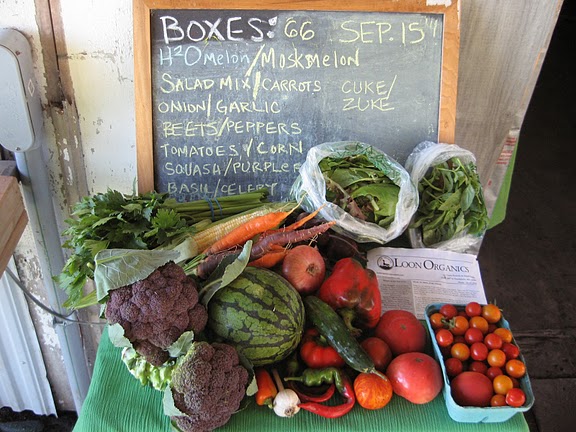Loon Organics
Enter Online Case Study
Acknowledgements
PDF version
Loon Organics was established in Minnesota in 2005. It is a certified organic vegetable farm that provides product to consumers through Community Supported Agriculture (CSA) subscriptions, a farmers market, and wholesale outlets.
This case study describes how the husband-and-wife team became interested in farming, how they got their training, and how they transitioned from farming on land rented from mentors to buying their own 40-acre farm. |
 |
Diverse aspects of their operation are described, including business and production planning, infrastructure and equipment, horticultural practices, and marketing models. The finances section is particularly detailed and valuable due to the financial data made available by Loon Organics. The unique challenges of managing an organic CSA operation are highlighted throughout the case study.
Farmer’s Perspective: Lessons Learned
Adam and Laura’s Top Ten Pieces of Advice for Start-up Vegetable Growers
- Work on vegetable farms of different scales, crops, soil types, and marketing outlets.
- Seek and cultivate relationships with mentors.
- Start small and increase business gradually. Learning how to have continuous product throughout the season is a genuine challenge.
- Rent land and borrow equipment until you are confident of your long-term commitment to farming.
- Support yourself off-farm for the first 4-5 years in order to reinvest all farming profits back into the business, save for future capital purchases, and avoid all debt other than a farm mortgage.
- Join farmer-based agricultural organizations and engage in farmer-to-farmer learning opportunities such as tours, field days, conferences, and workshops.
- Enroll in a farm financial planning and analysis course and get a great accountant.
- Explore and take advantage of traditional farm programs, loans, and small business resources through the USDA, FSA, state agricultural departments, university extension services, and community colleges.
- No matter what, take at least one day or half a day off each week.
- Have fun and don’t forget your sense of humor!
|